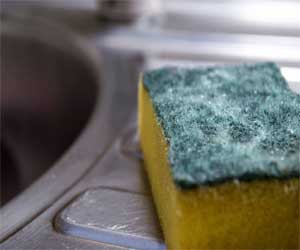- Home
- Editorial
- News
- Practice Guidelines
- Anesthesiology Guidelines
- Cancer Guidelines
- Cardiac Sciences Guidelines
- Critical Care Guidelines
- Dentistry Guidelines
- Dermatology Guidelines
- Diabetes and Endo Guidelines
- Diagnostics Guidelines
- ENT Guidelines
- Featured Practice Guidelines
- Gastroenterology Guidelines
- Geriatrics Guidelines
- Medicine Guidelines
- Nephrology Guidelines
- Neurosciences Guidelines
- Obs and Gynae Guidelines
- Ophthalmology Guidelines
- Orthopaedics Guidelines
- Paediatrics Guidelines
- Psychiatry Guidelines
- Pulmonology Guidelines
- Radiology Guidelines
- Surgery Guidelines
- Urology Guidelines
Bacteriophages-Key to counter antibiotic resistance found in kitchen Sponge

Researchers from the New York Institute of Technology have found that Bacteriophages key to counter Antibiotic resistance may be living in household kitchen sponges. As the threat of antibiotic resistance increases, bacteriophages, or phages for short, may prove useful in fighting bacteria that cannot be killed by antibiotics alone. The research is presented at ASM Microbe, the annual meeting of the American Society for Microbiology.
Antibiotic resistance is on the rise and Bacteriophages are seen as a possible therapy against multi-drug-resistant strains of many bacteria. Antibiotic resistance is one of the biggest threats to global health, food security, and development today. Bacteriophages — or phages — are viruses that target and kill bacteria. They live anywhere there are bacteria, including soil and water, and are being explored as an alternative treatment for drug-resistant infections.
A kitchen sponge is exposed to all kinds of different microbes, which form a vast microbiome of bacteria. Phages are the most abundant biological particles on the planet and are typically found wherever bacteria reside. With this understanding, kitchen sponges seemed a likely place to find them.
This project began as part of an undergraduate research class with seven students at the New York Institute of Technology (NYIT) in Old Westbury, New York.
Students in a research class isolated bacteria from their own used kitchen sponges and then used the bacteria as bait to find phages that could attack it. Two students successfully discovered phages that infect bacteria living in their kitchen sponges. "Our study illustrates the value in searching any microbial environment that could harbour potentially useful phages," said Brianna Weiss, a Life Sciences student at New York Institute of Technology.
The researchers decided to "swap" these two phages and see if they could cross-infect the other person's isolated bacteria. Consequently, the phages did kill the other's bacteria. "This led us to wonder if the bacteria strains were coincidentally the same, even though they came from two different sponges," said Weiss.
The researchers compared the DNA of both isolated strains of bacteria and discovered that they were both members of the Enterobacteriaceae family. These bacteria belong to a rod-shaped group of microbes commonly found in feces, where some cause infections in hospital settings. Although the strains are closely related, when performing biochemical testing they found chemical variations between them.
"These differences are important in understanding the range of bacteria that a phage can infect, which is also key to determining its ability to treat specific antibiotic-resistant infections," said Weiss. "Continuing our work, we hope to isolate and characterize more phages that can infect bacteria from a variety of microbial ecosystems, where some of these phages might be used to treat antibiotic-resistant bacterial infections."
The course was funded through internal grants provided by (NYIT), which also supported our later work to further characterize the isolated bacteria and bacteriophages. This second phase of our work will be presented on a poster at ASM Microbe on Sunday, June 23rd.

Disclaimer: This site is primarily intended for healthcare professionals. Any content/information on this website does not replace the advice of medical and/or health professionals and should not be construed as medical/diagnostic advice/endorsement or prescription. Use of this site is subject to our terms of use, privacy policy, advertisement policy. © 2020 Minerva Medical Treatment Pvt Ltd